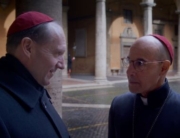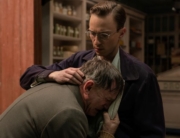The film opens abruptly, with a brash Alan Clay (Tom Hanks) selling to the camera something in the manner of the late pitchman Billy Mays. For a moment, one might confuse the film with one of the preceding ads or previews, but it quickly becomes apparent that Clay isn’t selling you a product—he’s selling you his life, one in which he’s lost his company, his wife, and his house. It’s a tough sell.
A sort of coming-of-middle-age film, A Hologram for the King gives us a hero who has nothing and plops him in the middle of the desert. The film is thoughtful, even methodical, as it introduces Clay’s worldview by showing us the breathtaking landscapes of Saudi Arabia and how alien his surroundings are to him. He’s there to pitch his team’s latest IT project, the eponymous hologram technology, to the king himself. First, however, he has to wade through bureaucracy and culture shock in a metropolis that’s still under construction, a city just as empty as he is.
The unfamiliarity of Saudi Arabia is front and center, but the film never fails to humanize those who live there. Early on, Clay enters an elevator with three Saudis, in traditional garb, engaging in a heated and unintelligible conversation. He’s visibly uncomfortable, until he sees that they’re playing some sword-and-sorcery video game on a tablet. Even across the globe, similarity is inescapable. Later, his quirky driver, Yousef (Alexander Black), worries that his car will be wired with explosives—not, as Clay assumes, by terrorists, but by the husband of the woman Yousef has been sexting. “We are separated by the thinnest filament,” as Zahra (Sarita Choudhury) later says to Clay, in a rare moment of intimacy for him.
The real tension does not come from the clash of cultures but from Clay himself. Nothing about his life is as it should be. His marriage seems to be irreparable—we only hear a few words from his ex-wife, and all of them are shrill. His relationship with his daughter is hampered by guilt, as the collapse of his company has left him unable to pay for her college education. Time after time, he pens a wrenchingly honest message to her, only to delete it all. Worst of all, a golf ball–sized growth has appeared near his spine. At the doctor’s office, he’s eager to list his troubles, clearly hoping that they’re related to the fleshy mass. Wouldn’t it be nice if one surgical cut could cure all of our problems?
Ultimately, it’s not a scalpel that brings him peace but an utterly breathtaking dive into the waters of Arabia. The lush sequence is a stark contrast to the shots of dusty cities and endless sand that compose the rest of the film, and afterwards, Clay is a new man, utterly revitalized by his connection with Zahra. It is, perhaps, a little too easy—love may be a powerful force, but it seems like it should take more to solve Clay’s crisis. As with his meeting with the king, everything falls into place.
Nevertheless, writer/director Tom Tykwer, adapting from Dave Eggers’s novel, has created a subtle examination of aging and alienation that isn’t afraid to laugh at itself. The actors play off each other with remarkable ease, and the camera always finds something remarkable to capture, even in the most desolate of places. All of this coalesces into a compelling story of a man’s well-earned transformation.







Leave A Comment